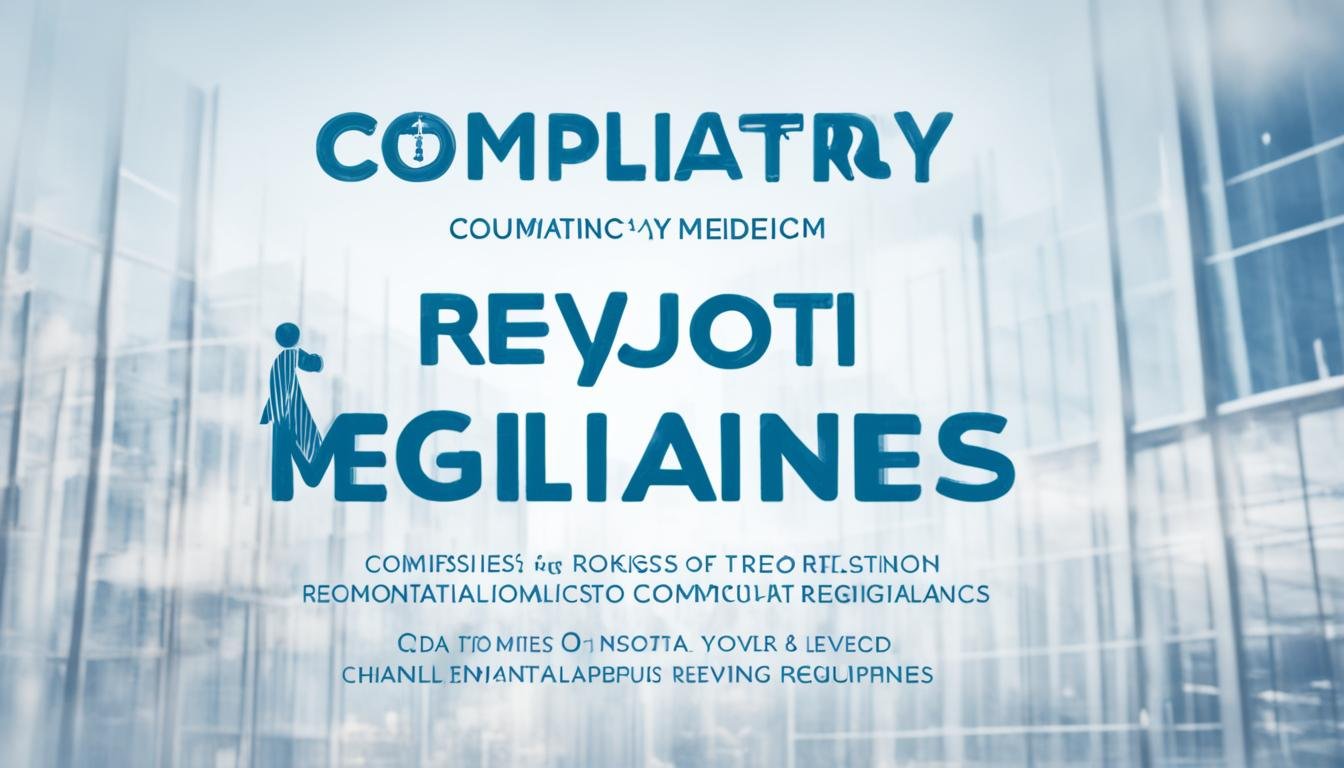Regulatory Compliance Guide for SMEs
Did you know that not following the rules can be super expensive for small businesses? They can face huge fines and penalties. Knowing and following these regulations is key to staying out of trouble and keeping a good image.
This guide dives deep into several areas SMEs need to focus on. This includes keeping data safe, following labor laws, looking after health and safety, tax rules, and more. By sticking to these guidelines, small businesses can stay on the right side of the law, reduce risks, and succeed.
Key Takeaways:
- Achieving compliance is essential for small businesses to avoid fines, penalties, and legal action.
- Data protection compliance, including GDPR and PCI DSS, is crucial for establishing trust with customers.
- Compliance with employment laws ensures legal protection and fosters a professional work environment.
- Health and safety compliance leads to higher employee morale and a positive reputation.
- Tax compliance is crucial for avoiding penalties and maintaining regulatory compliance in heavily regulated industries.
Data Protection Compliance for SMEs
Small firms must follow data protection rules to keep personal info safe. The General Data Protection Regulation (GDPR) is key. It controls how personal data is used and stored.
Complying with GDPR is important because not doing so can lead to big fines. It helps businesses win trust and keep customer info safe, avoiding harm to their reputation.
For those taking card payments, the PCI DSS rules also apply. They make sure cardholder information is secure and that data breaches are prevented.
Following these rules is crucial for customer happiness and loyalty. Secure data handling makes customers more likely to use a business’s services. Errors can cause both financial loss and harm to a firm’s reputation.
To be compliant, businesses need to audit their data. They must know what info they have, why they collect it, and how it’s used. This checks if they’re meeting GDPR rules.
Next, they create specific data protection rules and methods. They train their employees to understand and follow these rules carefully.
Ongoing checks and risk assessments keep businesses compliant. They help find and fix any weak spots before they cause problems.
Lastly, it’s vital to keep records of all compliance work done. This includes data on how info is used, firm policies, and staff training. These records show a firm is committed to protecting data.
“Compliance with data protection regulations is not only a legal obligation but also an opportunity for small businesses to build trust with their customers and protect their reputation.”
The Key Benefits of Data Protection Compliance for SMEs
Sticking to data protection rules has many pluses for small businesses:
- Data security: Strong data protection keeps customer data and systems safe from attacks and theft.
- Customer trust: It makes customers feel safe knowing their personal data is handled with care and privacy.
- Reputation management: It keeps negative press and customer losses at bay by preventing breaches.
- Competitive advantage: Being privacy-focused can draw in customers who value their personal data.
- Legal protection: It cuts the risk of fines and penalties, keeping the business safe in the long run.
Data Protection Compliance Checklist for SMEs
To be sure you’re compliant, use this checklist:
- Start with a full audit to know what personal data you have and why you use it.
- Check if your ways of managing data meet GDPR standards, and fix any issues found.
- Set clear procedures for collecting, storing, and using personal data.
- Train your team on handling data right and responsibly.
- Keep on auditing and managing risks linked to handling data.
- Always have measures in place to keep data safe from breaches.
- Keep detailed records on how data is used, your policies, and staff training to prove you’re following the law.
- Stay informed about and adopt any new data protection laws or changes that come along.
Following this checklist and making data protection a priority helps protect customer privacy, keep a good name, and succeed in a world that relies on data more and more.
Employment Law Compliance for SMEs
Staying within employment laws is vital for small companies. This ensures they are legally safe, avoid issues, and keep a professional and trusting workplace.
Following the minimum wage rules is a must. Small firms should make sure their staff gets at least the minimum pay. This keeps things fair and right in the workplace.
Also, not allowing discrimination is key. Small businesses need to follow laws that say no to unfair treatment. A diverse and welcoming workplace boosts team spirit and pulls in great team members.
Keeping the workplace safe is just as important. Small firms must meet safety standards to keep their staff safe. This means regular checks, teaching about safety, and putting safety steps in place.
In short, sticking to employment laws, including pay, non-discrimination, and safety, is a must for small firms. By picking out the right laws and taking action, they can smooth their way through these rules. This helps them keep a good name and a nice place to work.
The Importance of Employment Law Compliance
“Small businesses need to follow these work laws not just because they have to. Doing so helps them keep good staff, make the workplace better, and lower their legal worries. Choosing to do right by these laws helps both the business and its people.”
| Key Compliance Areas | Benefits |
|---|---|
| Minimum Wage Compliance | Ensures fair compensation for employees and fosters employee loyalty. |
| Anti-Discrimination Compliance | Creates a diverse and inclusive workplace, attracting top talent and reducing legal risks. |
| Workplace Safety Compliance | Promotes employee well-being, reduces accidents, and fosters a positive company culture. |
Health and Safety Compliance for SMEs
It’s vital for small businesses to ensure health and safety compliance. This shows they care about keeping the workplace safe for all. Following these rules leads to happier employees, less time off, and a good name in the market.
Firstly, a big part of compliance is doing thorough risk checks. Companies should find what could be dangerous, see how risky it is, and then fix it. This keeps accidents down and makes the workplace safer for everyone.
It’s also key to train staff on health and safety. This way, employees know how to spot dangers, use safety rules, and act in an emergency. Regular training updates keep everyone safe and reinforce a safety-first culture.
Benefits of Health and Safety Compliance:
- Enhanced employee morale and satisfaction
- Reduced workplace accidents and injuries
- Improved productivity and efficiency
- Positive reputation and brand image
By obeying these rules, businesses look after their workers and customers. This keeps the company strong by avoiding fines and lawsuits. It also protects the business’s name.
Ensuring a safe workplace, doing risk checks, and training are key for health and safety. When small businesses put their staff first, they make a work environment that’s both safe and productive.
Refer to the image below to visualize the importance of health and safety compliance in creating a safe working environment:
Takeaway:
Health and safety are critical for a small company’s success. Setting rules, checking risks, and training people make a safe space. This not only keeps the law but also boosts the business’s image and success.
Tax Compliance for SMEs
Small businesses are critical for the economy. They must follow tax rules to stay financially strong. This includes paying income tax, corporation tax, and VAT.
Income tax is what businesses and people pay on what they earn. Small businesses calculate and pay this tax on their profits. Not following these rules can lead to fines and hurt the business’s finances.
Corporation tax covers what companies make in profits. Businesses operating as corporations pay this tax. Adhering to these tax laws is vital for a business’s financial health.
For those selling goods or services, VAT compliance is key. It involves charging customers and keeping accurate records. Failing to do so can result in fines and legal trouble.
Tax laws are critical for businesses in heavily regulated sectors like finance. Not complying could limit what services they offer, reducing profits and growth.
Staying Updated and Meeting Obligations
Keeping up with tax laws is a challenge. Businesses must know deadlines and rules. Professionals in small business tax can offer valuable advice and help.
Using tax software and online tools makes filing taxes easier. They cut down on mistakes and save time.
Benefits of Tax Compliance
Following tax laws helps small businesses in many ways. It avoids fines and legal problems. It also keeps finance records accurate.
- Risk mitigation: Complying with tax laws keeps businesses from facing fines and legal issues.
- Financial stability: It ensures a business’s financial books are in order, promoting stability.
- Reputation: Businesses that comply with taxes earn trust from customers and others, which bolsters their reputation.
- Access to incentives: Compliance opens up opportunities for tax breaks, possibly saving money.
Staying on top of tax obligations is ongoing. It means keeping detailed financial records. This is crucial for audits or when tax authorities check.
Running a successful business means following tax rules. By keeping updated, seeking professional advice, and meeting obligations, small businesses can thrive. They ensure their ongoing growth and success.
Anti-Money Laundering Compliance for SMEs
Small businesses that use cash or do financial deals must follow AML rules. Doing so is key for gaining trust from customers, partners, and banks. By sticking to AML rules, these firms not just stay legal but also keep away from illegal stuff. It helps them grow safely.
The Importance of AML Compliance
It’s crucial for small companies to be AML compliant. This shows they’re about doing the right thing and ensures they’re not used for shady money matters. Sticking to AML rules is a must-do. It helps a business build a great name and lasting bonds with clients and partners.
Small firms that follow AML rules are trusted by banks. This trust is needed for loans, merchant accounts, and other money services. Such actions also shield a business from fines and legal trouble.
Key Elements of AML Compliance
To be AML compliant, set up thorough policies and steps. These include:
- Customer Due Diligence (CDD): Check customer backgrounds well, confirm who they are, and assess any risk.
- Transaction Monitoring: Watch over financial deals for odd or suspicious signs, like big cash moves.
- Record-Keeping: Keep precise records of all customer details, deals, and checks.
- Employee Training: Teach workers often about AML rules, what to watch out for, and how to report issues.
- Reporting Suspicious Activities: Instantly report any fishy deals to the right officials.
AML Compliance Challenges for SMEs
But for small companies, meeting AML rules is harder. They might not have a lot of money or experts for this. So, they can struggle to make solid AML systems.
“Meeting AML norms is tough and needs a lot of effort for small businesses. But not doing so can lead to big fines and a bad name. So, it’s really important for them to focus on AML.”
To tackle AML needs, investing in tech and software can help. Also, getting advice from pros or joining AML support groups can be smart for small firms.
Industry-Specific Regulations for SMEs
Small businesses need to follow more than just basic rules. They must also stick to special regulations for their industry. These rules are designed for safety and honesty in each type of business.
Foods Safety Regulations
In the food sector, places like restaurants and food makers have strict rules to follow. These are to make sure the food is safe. Obeying these rules is required by law. It’s also key for keeping customers safe and happy.
Financial Regulations
Finance companies and businesses must also follow special rules. These are to keep things fair and safe for their customers. Rules against money laundering and checks on customers are some examples. Following these rules helps keep the financial world strong and reliable.
Other Sector-Specific Compliance
Healthcare and aviation are just a couple of examples of fields with their own rules. In healthcare, they must protect patient info by following privacy laws. The aviation sector has rules on how to keep things safe and well-maintained.
Adhering to these special regulations is key for small businesses. It shows they care about the quality and safety of their work. It proves they value honesty, good ways of working, and making their customers happy.
Small businesses need to know the rules that fit their field and make a plan to follow them. This includes checking their work regularly, making needed changes, and teaching their staff what to do. Not following these rules can lead to big problems, like fines or closing down.
Working hard to meet both general and special rules makes small businesses stand out as honest and reliable. This is how they earn trust in their industry.
Small Business Compliance Tips
Following the rules is key for small businesses. This helps them stay legal and lower risks. We’re sharing these tips to keep SMEs compliant and up-to-date with the law:
- Seek Expert Advice: If you’re not sure about a rule, get advice from someone who knows. This can help you understand the regulations correctly and avoid big mistakes.
- Create a Compliance Plan: Make a plan that covers everything you need to do to follow the law. Your plan should list what laws you must follow, what to do to follow them, and who’s in charge of each part.
- Regularly Monitor Compliance: Compliance work never stops. Check often to make sure you’re still following the rules. Look at how well your plan is working, find any problems, and fix them right away.
- Keep Records of Compliance Activities: It’s important to keep detailed records of your compliance work. This includes keeping track of your policies, training, and any steps you take to fix problems.
Following these tips will help small businesses be better at following the law. It lowers their risk and helps them earn trust in their field.
Expert Advice
“Getting expert help is crucial for small firms to deal with tough compliance issues. By working with compliance experts, you can get the right advice and make sure you’re always following the rules.”
| Compliance Tip | Description |
|---|---|
| Seek Expert Advice | Consulting professionals for accurate interpretation of regulations and compliance guidance. |
| Create a Compliance Plan | Developing a comprehensive plan outlining steps, responsibilities, and actions for compliance. |
| Regularly Monitor Compliance | Ongoing monitoring and review of compliance activities to ensure adherence to regulations. |
| Keep Records of Compliance Activities | Maintaining detailed documentation of compliance policies, training, risk assessments, and actions taken. |
Compliance Support for SMEs
Small businesses find complex rules hard to follow. But, there are many resources to help them. These resources give them the info they need. They help set up strong plans for following the rules and avoid risks.
Benefits of Compliance Support Resources
These resources are a big help for small businesses. They provide:
- Best Practice Guides: Guides that show the best steps to follow, made just for small businesses. These guides help understand and meet the rules of each industry.
- Checklists: Checklists make it easy to see if all steps are done. This helps businesses know their compliance status at a glance.
- Training Presentations: There are also talks and lessons about compliance. These teach everyone in the business their roles in following the rules.
- E-Learning Modules: Online classes are another option. They are easy to access and can be fun. They help learn and remember important rules.
With these tools, small businesses can manage their compliance well.
Accessing Compliance Training Aids
Training aids are key for SMEs to keep up with rules. They can find these aids in different places:
- Online Platforms: Many websites have compliance help for small businesses. They have different types of training like videos and guides.
- Industry Associations: Groups that focus on certain industries offer help too. SMEs can learn the latest rules and how to follow them right.
- Government Websites: Federal, state, and local governments share lots of resources. These include guides and programs that help with many rules.
Exploring these options helps small businesses learn and plan for compliance.
Compliance resources are crucial for small business success. By using these supports, SMEs can protect their businesses from risks.
Conclusion
Being compliant is crucial for small businesses to thrive and last. It means meeting legal rules to dodge trouble. To stay on top, SMEs should follow tips and seek help from pros. They must keep up with the latest rules too. With solid plans and knowledge, small businesses can build trust and keep a good name for the long haul.







